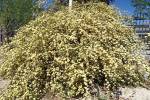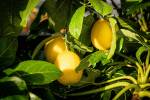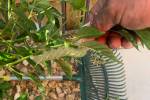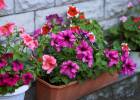Simple steps can help save your ailing houseplants
Are your houseplants in trouble? Most houseplant problems come down to water, light, air or pot issues.
Water: Houseplants thrive in moist soil -- not too wet or dry. Using the analogy of a sponge, you want water to squeeze out, but not run out. Any plant that dries out usually drops its older leaves.
Because of the way we heat and cool our homes, houseplants dry out faster. Small plants may need water daily, while larger plants may get by with weekly irrigations. Use a good potting soil to prolong the time between irrigations. When it gets right down to it, watering is an art you must learn.
Here are conditions causing plants to require more water: higher temperatures, bright sunlight, low humidity, poor air circulation, plants in clay pots and root-bound conditions. So keep your eye focused on these situations.
If the rootball does dry out, soil shrinks away from the pot. It then becomes hydrophobic, so water never soaks the rootball and runs out the bottom fast, leaving the rootball dry. If this is so, stir the surface soil and press it against the pot walls, and then set pot in a pan of water to resoak the rootball. During later waterings, water from the top slowly until water runs from the pot.
Light: Not every plant needs the same amount of light. Your houseplant is not getting enough light if there is a lot of space between internodes or if older leaves drop. Move plants closer to a window, or under artificial lighting.
If plants scorch or bleach out, they may be getting too much light. Pull plants away from your light source.
Air circulation: Fresh air circulation is essential for healthy plants. If they have brown edges, they are suffering from stale air brought on by our heating and cooling systems. Most plants will survive as long as air circulates around them. Just opening some doors and windows within the home will solve this. If plants are in small rooms, circulate the air with a fan. To increase moisture in the air, cluster plants and mist them periodically.
Pot bound: Eventually, indoor plants need repotting. Here are three telltale signs houseplant roots needs more space: roots growing out of drainage holes, bottom leaves turning yellow and dropping, and plants that frequently wilt.
If you must repot, select a pot two sizes larger than its current pot. One of the quickest ways to kill houseplants is putting them in too big of a pot. The roots kill themselves trying to find their boundaries and top growth suffers.
Soil is important when repotting plants. Nurseries have several kinds to choose from.
It is easy to repot if you follow these steps:
1. Remove any crusty soil forming on the soil surface to get rid of salts.
2. Tip plant upside down and gently tap the pot until you dislodge the plant.
3. Spread roots out and remove the largest ones. No, it won't hurt them.
4. Cover drainage hole with a piece of door screen to prevent erosion and staining furniture.
5. Place some soil in your pot and place the plant so it's the same level it was in the previous pot.
6. Fill in and firm the soil around the rootball.
7. Leave an inch of space at the top to contain water when irrigating.
8. Thoroughly soak the plant and allow it to drain before locating it in the home.
9. Fertilize monthly with a houseplant food and follow with a good irrigation.
SEMINARS
The following seminars take place at the Springs Preserve, 333 S. Valley View Blvd. You are advised to preregister for classes by calling 822-7786.
Drip irrigation: Learn complete drip-irrigation system installation from the street to plants, including selecting and assembling components. Build a drip system in class to see how easy it is to save water and have great plants. This free class is at 6 p.m. Thursday.
Birds at Springs Preserve: Let the Red Rock Audubon Society take you on a tour of the gardens to help you spot birds and learn how to attract them to your landscape. Bring binoculars for your viewing pleasure. It is at 8 a.m. Saturday.
Your holidays with herbs: Herbs from the garden are delectable and terrific for holiday gifts or cooking. Learn how herbs lend themselves to indoor or outdoor gardening and be inspired by ideas for herbal holiday baskets or pots. It is at 8:30 a.m. Saturday.
Linn Mills writes a garden column each Sunday. You can reach him at linn.mills@springspreserve.org or call him at 822-7754.























